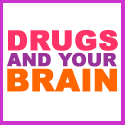A Guide to Drugs and the Brain

Home
Drug Effects
Drug Research
Drug Street Names
Back to NFIA
Commentary
Drugs and
the Brain
Addictive drugs enter the body through a number of routes, make their
way into the bloodstream, and go straight to the brain where they exert
their effects.
Scientists have determined that most addictive drugs initially act on one part of the brain, the brain reward system. This part rewards us when we do the things we must do to survive--eating, drinking, having sex to perpetuate our species, and so on. Cells in this part of the brain release chemicals that make us feel good (reward us) when we engage in these behaviors and teach us to repeat them.
Drugs mimic the brain's natural chemicals. Instead of teaching us to repeat survival-oriented behaviors, drugs teach us to take more drugs. If use continues, drugs gradually change the brain and these changes can eventually lead to addiction.
Such short-term effects as intoxication, impairment of judgment, and, occasionally, overdose are also the result of drugs' actions on the brain.
About • Site Map • Privacy
© Copyright 2001 National Families in Action. All rights reserved.
Questions? Write to nfia@nationalfamilies.org.